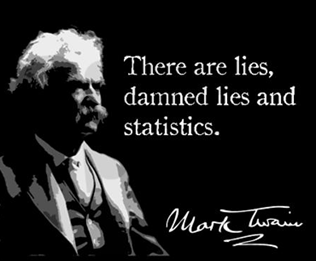
Posted on 02/07/2020 3:15:54 PM PST by spintreebob
Careful what we believe.
Long before computers there were lies,dam’lies and statistics.
My next-door-neighbor and I were discussing this very thing
a few nights ago at my fire-pit with some good bourbon.
I contend that if the climate ‘researchers’ had to testify as to their grant money and their findings under oath the entire hoax would collapse
Since I don’t know what a p-value is, I cannot appreciate the depth of wisdom shown in the article.
And yet with computers the charade continues vis-a-vis corrupt code. 8>)
Statistics done Lie, but Liars use Statistics.
the trans community has been lying about p values for years...
“Recently, p-values have been criticized and even banned by some journals, because they are used by researchers, who cherry-pick observations and repeat experiments until they obtain a p-value worth publishing to obtain grant money, get tenure, or for political reasons”
There is nothing wrong with P Values. If you cherry pick the data all the results are crap. It is no longer valid data.
95% of an unknown number of scientists agree with me./s
>>Long before computers there were lies,dam’lies and statistics.<<
Computers have the ability to make many errors very quickly.
And here I thought this was going to be helpful when I met with my parole officer. Aaaarrgghh!
Since we are talking about p-values, it would have been a lot more believable if you had stated that you were drinking beer.
You are right!

There are liars, damn liars, and statisticians.
This is the kernel of how Climate “Science” works.
Statistically speaking, people who drink bourbon near fire pits at night are happier than those who do not.
(-:
Will you marry me?
Also, journals often refuse to consider publishing results with negative findings, which makes the problem much worse.
For example, Researcher A repeats experiment X with slight (but insubstantial) modifications, and finds that his sugar water kills cancer cells better than chance with p<0.05. Researchers B, C and D repeat the experiment but find it does nothing, and their department chair tells them to move on to the next series of experiments, because he believes (rightly) that journals are looking to publish positive findings, and generally findings of no effect will not make it through the peer review process (which is long and time consuming). I don't believe these things are intentional though. When I did biomed research I saw this a lot; researchers had good intentions but did not understand statistics. It is not just ignorance, it is often lack of sufficient intellect to be a good scientist. It would be nice if every researcher were a genius who had a natural, confident grasp of all scientific disciplines related to their area of study, but i think we set a pretty low bar for entry into STEM careers.
Disclaimer: Opinions posted on Free Republic are those of the individual posters and do not necessarily represent the opinion of Free Republic or its management. All materials posted herein are protected by copyright law and the exemption for fair use of copyrighted works.